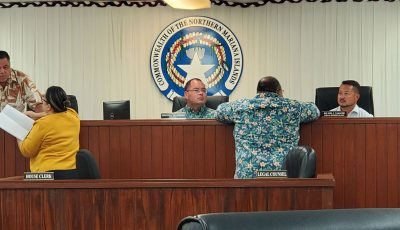Spooky
Some of the spookiest events before Halloween took place on Capital Hill where, among other things, senators passed an initiative for voters to decide on a proposed constitutional change so that revenue-generating bills can also originate from the Senate.
That’s all because the author, Sen. Justo Quitugua (Ind-Saipan), along with his colleagues, believes the Senate has “great ideas” for raising revenues and not because they themselves discovered flaws in the “Origination Clause” that should be fixed for the sake of the CNMI alone.
This is from the same Senate whose other recent “ideas” included pushing for and obtaining a Senate and House leadership funding increase while thousands of residents are still recovering from Typhoon Soudelor’s devastation and government agencies lacking funds and other resources to help the typhoon victims.
It’s the same Senate whose other “idea” allowed each Saipan senator a $2,500 monthly or $30,000 yearly subsistence allowance to be at least not left behind by Rota and Tinian senators who each gets a $5,000 monthly or $60,000 yearly subsistence allowance.
The stipend for Rota and Tinian senators is much more than the constitutionally protected salary of $39,300 a year or $3,275 a month, on top of other perks.
Instead of leading the way in bringing down government costs and passing sound revenue generating bills the proper way, a number of lawmakers have become a poster child for all things wrong in government.
This image will not go away until lawmakers become more responsible and mindful of the islands’ fiscal realities, rather than taking as much resources for themselves as possible while basic public services such as health and safety remain underfunded.
Back to Quitugua’s Senate legislative initiative. This one shouldn’t move any further and should be rejected by the House right away. This is not only because of the recent questionable ideas and actions by this Senate, but especially because of the reasons why the framers of the U.S. Constitution made sure revenue-generating bills originate in the House of Representatives and not the Senate.
The “Origination Clause” is part of the United States Constitution that says all bills for raising revenue must start in the House of Representatives, but the Senate can amend them as in the case of other bills. The CNMI Constitution reflects this provision.
The House of Representatives is invested with the “power of the purse,” or the ability to tax and spend public money for the national government. Massachusetts’ Elbridge Gerry said at the Federal Constitutional Convention that the House “was more immediately the representatives of the people, and it was a maxim that the people ought to hold the purse-strings.”
You’re probably familiar with the phrase, “No taxation without representation.” People’s representatives were the ones given sole power to tax the people.
It was also another device sanctioned by the framers of the U.S. Constitution to preserve and enforce the separation of powers.
But Senates past and present have developed a way to avoid the Origination Clause by replacing the entire text of a bill that technically originates in the House but retains the same House designated bill number. The uncomplimentary term for this practice is “gut and replace.”
For yet another trick-or-treat, the Senate also unanimously overrode last week some vetoed provisions in the fiscal year 2016 budget law: giving 100 percent reprogramming authority to the chief justice and mayors, allocating funds for the CNMI drug court, and allowing 5 percent salary increases to law enforcement personnel.
Now that a drug court has been established via a separate law, and all parties agree on the need to get the drug court off the ground immediately, it makes sense to fund it right away if the resources have already been identified. But the two other provisions remain questionable.
As the governor earlier wrote, requiring law enforcement personnel to use 5 percent of their personnel budget to fund the salary increase mandate would require agencies to cut staff and would run counter to the 25-percent cap on overtime.
The governor also earlier wrote that the 5 percent salary hike provision did not account for personnel on Rota and Tinian, which he said would create morale problems. But the Senate insists it does include Rota and Tinian law enforcement.
Moreover, the Senate passed—with amendments—a House bill amending the Saipan casino law. The Senate amendments include requiring legislative approval if the casino commission wants to revoke Saipan exclusive casino licensee Best Sunshine. Why would lawmakers, most of whom rushed the passage of the Saipan casino bill without public hearings, need to have a final say on a regulatory matter?
This further raises suspicion that some or many lawmakers would go to great lengths to protect Best Sunshine, even if and when the regulatory casino commission finds the licensee violating laws and regulations. This, after approving salary increases for casino commissioners.
If there’s one good thing, it was the Senate’s deletion of proposed provision that would have exempted Best Sunshine from enclosing its casino floor off from the harmful secondhand smoke that emanates from its gaming floor.
Kudos to health officials who successfully made their voices heard loud and clear. But the need for heightened vigilance is not over yet because the House might still insist on this provision. Boo!



























